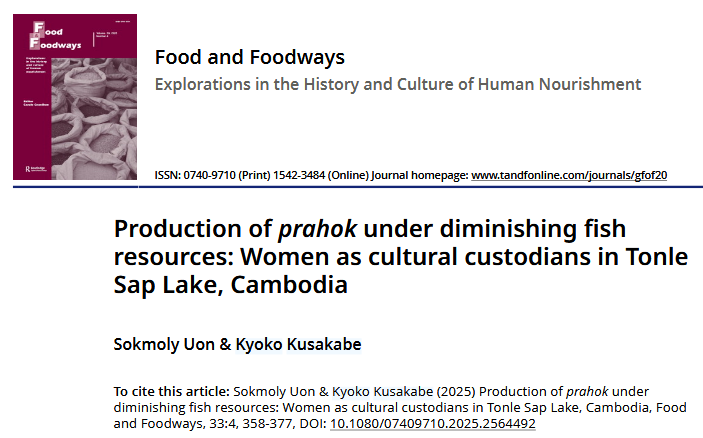A recent publication by Sokmoly Uon, DFM Cambodia student researcher, and Professor Kyoko Kusakabe, DFM Cambodia Lead and faculty at the Asian Institute of Technology, examines how Cambodian women sustain prahok which is a fermented fish paste central to the country’s cuisine and identity—amid declining fish resources in the Tonle Sap Lake region.
Published in Food and Foodways, the article titled “Production of Prahok under Diminishing Fish Resources: Women as Cultural Custodians in Tonle Sap Lake, Cambodia” explores how women producers adapt to ecological and economic pressures while maintaining prahok production as both livelihood and cultural practice.
The study finds that women’s decisions to continue producing prahok are shaped by intersecting factors including climate variability, market access, household composition, and gender norms. Despite reduced profitability, many persist motivated by their roles as caregivers, food providers, and custodians of cultural knowledge. Prahok, the authors argue, functions simultaneously as food, identity, and heritage.
By highlighting women’s agency within small-scale fisheries, the paper positions prahok production as a site where gendered labour, cultural continuity, and economic adaptation intersect. The research underscores how women’s practices sustain both nutritional security and social identity under conditions of ecological change.
This study contributes to Dried Fish Matters’ mandate of understanding gendered social economies of dried and fermented fish across South and Southeast Asia, emphasizing the role of women in preserving traditional food systems amid shifting environmental and market realities.
Citation & link:
Uon, Sokmoly, and Kyoko Kusakabe. 2025. Production of Prahok under Diminishing Fish Resources: Women as Cultural Custodians in Tonle Sap Lake, Cambodia. Food and Foodways. https://doi.org/10.1080/07409710.2025.2564492

